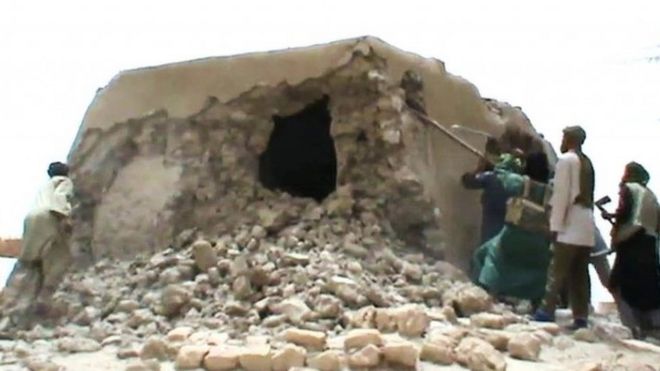By Tyler Campbell
Impunity Watch Reporter, Africa
THE HAGUE, Netherlands – This September the International Criminal Court faced its first suspect charged with deliberately destroying religious or historical monuments. The suspect’s name is Ahmad Al Faqi Al Mahdi and he is charged in connection with the destruction of historic monuments in Timbuktu. This destruction took place in 2012 when Islamist Tuareg rebels took over the city and destroyed 14 of cities 16 historic mausoleums. These mausoleums had been labeled and protected as parts of a UNESCO World Heritage Site.

The ICC’s accusation against Mahdi reads that he committed a “direct attack against buildings dedicated to religion, education, art, science or charitable purposes, and historic monuments.” This charge has been grouped under the larger umbrella of war crimes. The ICC issued a warrant for Mahdi since he is considers a war criminal for these acts. The case was transferred from the Niger court, by the prosecuting attorney Fatou Bensouda, to the ICC after it issued a warrant on September 18.
Judge Cuno Tarfusser heard Mahdi’s opening statements and set the date for the first formal hearing on January 18, 2016. During this hearing Mahdi gave some basic information about himself saying, “My name is Ahmad Al Faqi Al Mahdi, and I am from the Tuareg tribe… I was born about 40 years ago. I am a graduated of the teacher’s institute in Timbuktu and I was a civil servant in the education department… beginning in 2011.” He also asked to be spoken to in Arabic but declined further statements until he consulted his lawyers.
Prosecution at the ICC has alleged that Mahadi was at the head of the Hesbah during the Islamist Tuareg rebels control of Timbuktu in 2012 through 2013. The Hesbah acted as a sort of morality police, enforcing the Islamic religion, during this time period and lead the attack on 10 of the protected historical monuments. The Hesbah targeted these buildings because they were seen as symbols of idolatry to the Islamic faith.
The leader of the UN Educational, Scientific and Cultural Organization (UNESCO), Irina Bokova, applauded the decision by the Niger prosecution to transfer this case to the ICC. The direct attack by the Tuareg rebels was seen as a crime against not only the people of Timbuktu but also the world. “The cultural heritage of Mali belongs to all humanity,” she said in a statement given after the transfer. Since the attack, UNESCO has been busy helping the people of Timbuktu rebuild the 14 mausoleums that were destroyed during the occupation. The buildings can be rebuilt, but the thousands of ancient manuscripts that were burnt during the occupation, sadly, are lost forever.
For more information, please see:
BBC – Timbuktu mausoleum destruction suspect appears at ICC – 30 September 2015
Deutsche Welle – Islamist leader faces ICC over Timbuktu mausoleum destruction – 30 September 2015
AP – Suspect in destruction of Timbuktu mausoleums sent to ICC – 26 September 2015